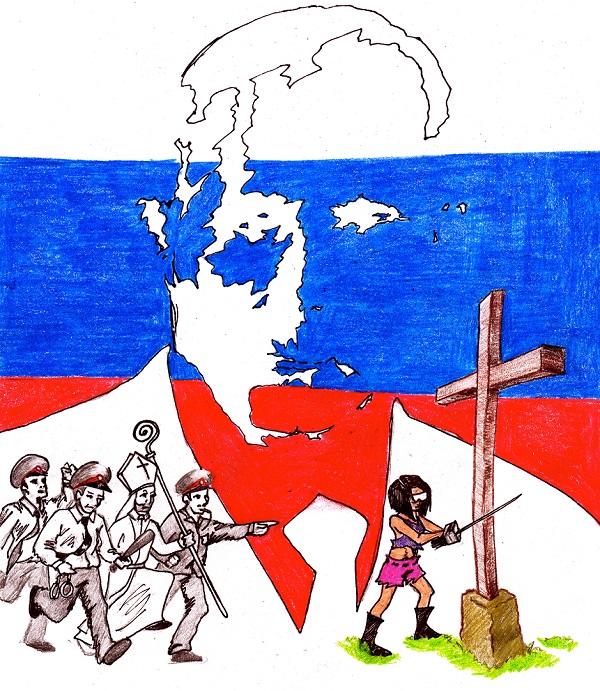Afraid of the Wolves: Pussy Riot and Political Protest in Russia
On Feb. 21, Moscow’s Cathedral of Christ the Savior became the stage of Pussy Riot’s “Punk Prayer.” To the accompaniment of abrasive guitar noise, the group sang lyrics such as “Virgin Mary, Mother of God, banish Putin, banish Putin,” “Virgin Mary, Mother of God/be a feminist, we pray thee. /Bless our festering bastard-boss. /Let black cars parade the Cross” and “Don’t upset His Saintship, ladies, /stick to making love and babies. /Crap, crap, this godliness crap! /Crap, crap, this holiness crap!”1
Unsurprisingly, this performance led to a firestorm of religious and political outrage in Russia, a country certainly not famed for its tolerance of dissent. The political, feminist punk rock collective is well known for such controversial acts of public protest, but for this demonstration, two of its members now face two-year prison sentences in an infamous penal colony. In the aftermath of the incident, with such high-profile figures as Madonna, Björk, and Kate Nash campaigning for their release, the onset of many solidarity protests around the world and ongoing criticism of the Russian government’s response, it is interesting examine this provocative feminist protest and what it reveals about free speech in Russia.
The choice of venue for the protest, it seems, reflects the group’s anger at the re-election of Vladimir Putin and the increasingly close relationship between the Russian Orthodox Church and the government. The members alluded to the Church’s support of Putin’s reelection and lamented that the Church had been allowed “to become a weapon in a dirty election campaign” and had “urged the faithful to vote for a man who is as far as can be from God’s truth.”2 Pussy Riot’s feminist views are also a cause for them to condemn Putin’s politics and the Church. The group’s leader, Nadezhda Tolokonnikova, blames both Putin’s ideology of a “sovereign democracy” and the Church’s focus on the domestic and maternal roles of females for turning “women into slaves.”3
Whatever grievances Pussy Riot has against the Church and Putin, the fact remains that the group members offended quite a lot of people and are now facing a two-year prison sentence on charges of “premeditated hooliganism performed by an organized group of people motivated by religious hatred or hostility.”4 While this is less severe than the originally proposed seven-year prison sentence, it is still a stern verdict. Indeed, it appears unrealistic to expect impartiality and fairness from this trial. Says Tolokonnikova, “The criminal trial is Putin’s personal revenge, and no one can predict how and when an authoritarian system will exact revenge.”5
However, the very severity of Pussy Riot’s sentence seems to achieved what they were aiming for in the first place; awareness of Putin’s authoritative and oppressive influence in Russian politics. The outrage has been staggering in European countries and in the US; prominent musicians, politicians, and journalists have joined the movement to “Free Pussy Riot!” Complementary protest movements have sprung in many places in response to Pussy Riot’s imprisonment and the Kremlin has even been troubled by a resurgence of the anti-Putin protests that wracked the country last winter.6 Tolokonnikova asserts “This system delivered a verdict on itself, by sentencing us to two years in prison although we committed no crime.”7
Pussy Riot’s protest has also led to some revelations about social sentiments within Russia. First, there was deputy Prime Minister Dmitry Rogozin’s unsavory response to Madonna’s support of the protesters; he called her a moralizing “slut” and added that she should “either take off the cross or put on some underwear.”8 Then there are the polls of Russian citizens that show that, in stark contrast to Western opinion, many Russians agree with their government’s strict dealing with the Pussy Riot members. Indeed, it appears that many Russians may view the incident in an entirely different light than most foreigners; in a nationwide poll, 42 percent of Russians attributed Pussy Riot’s arrest solely to their insult of the shrines and beliefs of the Church, perhaps due to the incident’s representation in the Russian media.9 To most non-Russians, however, the fight seems to focus on the fact that Pussy Riot was challenging an authoritarian political system.
Pussy Riot appears to have achieved the provocation and attracted the attention that their “Punk Prayer” intended. Putin’s politics are now under closer scrutiny by those Westerners who will never miss an opportunity to champion free speech and political freedom. But are the Pussy Riot members paying a high price for this increased awareness? Nadezhda Tolokonnikova seems to regret nothing. “If you’re afraid of wolves, you shouldn’t go into the forest. I’m not afraid of wolves. I’m fighting for my daughter to be able to grow up in a free country.” She declares a great love for Russia and an intention “to destroy the things I consider the greatest evils. And I’m doing this by putting my ideas of freedom and feminism into practice.”10
Notes
1. Rumens, Carol. “Pussy Riot’s Punk Prayer is pure protest poetry.”
The Guardian. August 20, 2012. http://www.guardian.co.uk/books/2012/aug/20/pussy-riot-punk-prayer-lyrics
2. Ria Novosti Website Group. “Pussy Riot Hit Back at Church Criticism.”
RIANOVOSTI. March 27, 2012. http://en.rian.ru/russia/20120327/172417090.html (accessed October 12, 2012).
3. Spiegel. “Interview with Pussy Riot Leader.” Spiegel Online International.
September 3, 2012. http://www.spiegel.de/international/world/spiegel-interview-with-pussy-riot-activist-nadezhda-tolokonnikova-a-853546.html (accessed October 12, 2012).
4. Wikipedia. “Pussy Riot.” Wikipedia. http://en.wikipedia.org/wiki/Pussy_Riot
(accessed october 12, 2012).
5. (Spiegel 2012).
6. The Guardian. “Russia: tens of thousands turn out for anti-Putin rally.” The
Guardian. September 15, 2012. http://www.guardian.co.uk/world/2012/sep/16/russia-anti-putin-protest-moscow (accessed October 12, 2012).
7. (Spiegel 2012)
8. The Guardian. “Pussy Riot case: Madonna labelled a moralising ‘slut’.” The
Guardian. August 9, 2012. http://www.guardian.co.uk/music/2012/aug/09/pussy-riot-madonna-called-moralising-slut (accessed October 12, 2012).
9. (Wikipedia n.d.)
10. (Spiegel 2012)

![[in]Visible Magazine](https://community.scrippscollege.edu/invisible/wp-content/uploads/sites/5/2011/04/Invisible-Masthead-2011-Spring1.png)








No comments yet... Be the first to leave a reply!